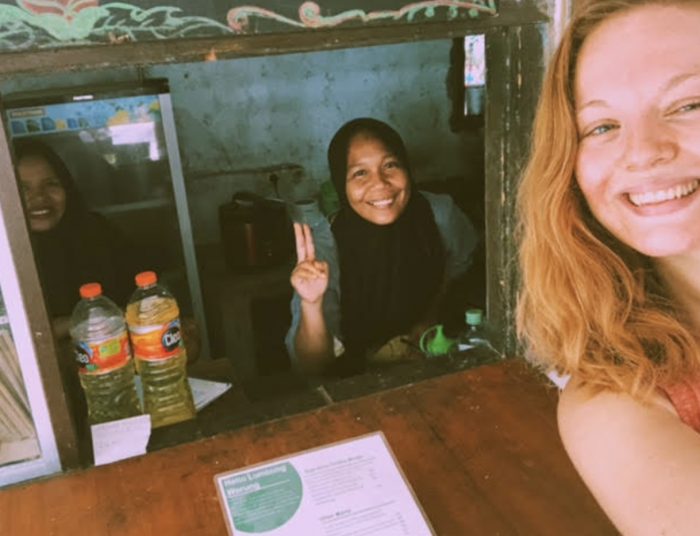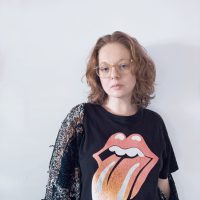We don’t need less—we need less opportunity to have more.
When I first stepped foot back onto North American soil after living in countries like Cambodia, Indonesia, and India for over a year and a half, something I had never truly noticed became overwhelmingly obvious.
To the point of panic, pain, and otherwordly destruction of mind, body, and soul.
While I was abroad, all I had was a backpack, a harmonium, and a radically alive faith. My harmonium’s name is Sara, short for Saraswati, and she was given to me by a friend while I was in Indonesia. She is a tough one to travel with, but so, so worth it.
The belongings in my backpack were true necessities in my perspective—but probably not in the way you’d think.
I had clothes, which I often traded with others or left behind every time I boarded a plane, my favorite books that I took everywhere with me, and my traveling altar. It included pictures and tapestries of those whom I recognize as the embodied spirit, small tokens that people had given to me along my journey, coins from all over the globe, incense, murti’s, and notes from friends, loved ones, and strangers I had undeniably divine moments with.
I set that altar up wherever I went. It truly became my home within every space.
I had all of these things in my backpack, and yet I didn’t own a pair of tweezers. I didn’t have a razor. I didn’t wear deodorant. I didn’t have any kind of hair or body product that wasn’t soap or oil. My toiletry bag was smaller than my palm, as my main source of cleansing and beautifying came from the foods I ate, the experiences I had, and the moments that changed me forever.
And I was the healthiest (and most beautiful, in my eyes) I have ever been.
The places I lived while in Asia were small towns, tiny islands, in the middle of jungles, and at the foothills of the Himalayas. My diet and lifestyle continuously changed wherever I was, as I did not have access to the same kinds of foods or experiences wherever I landed.
Routine was a hilarious concept that was never my reality. I was a walking conundrum at every moment.
While I was in Cambodia, I ate a lot of rice and drank a lot of coconuts. Sugarcane juice became my favorite indulgence. I spent a lot of time inside of my mosquito net and on the back of motorized scooters. I watched in awe as families on the side of the road, surrounded by plastic and garbage, sang, danced, and laughed in joy as they had food, a picnic, and each other.
That was all they needed, and I was absolutely in awe of them.
In India, I ate a lot of curry and drank a lot of chai. I wandered through Himalayan mountains where I regularly shared dirt roads with donkeys carrying goods up to the highest point of the mountain tops and cows making their way back to where they called home. I walked everywhere—for miles and miles and miles. I watched women carry what I could not carry with my own hands balanced on top of their heads.
I watched people come alive in a way I never knew was possible. I watched the divine mother, continuously unfolding, in every moment.
In Indonesia, I ate a lot of fruit and swam in crystal clear waters. I rode my bike everywhere as I lived on an island with zero motorized vehicles. I sang to cows on my walks at dawn. I sat in the sand every day come nightfall, as the sky turned colors that only angels could create to show the world that miracles exist.
I became a walking embodiment of empowerment that I did not realize existed, not only within myself but within the world as I knew it.
All throughout this time, I did not regularly have access to the internet or other first-world resources. I faced challenges wherever I went. I got sick, needed medicine, and I felt helpless.
I was desperate for fresh lettuce while I was in India but couldn’t find it anywhere I went, and even if I did, I probably wouldn’t have eaten it (food poisoning in India is a no joke).
In Indonesia, I needed to get a pap, but I would have had to travel almost an entire day to find a doctor that did regular women’s health checkups, and there was no way for me to contact them. In Cambodia, I couldn’t get any mail sent to me, as I was practically living in the jungle.
Everywhere I was, I didn’t have access to my normal indulgences: television, chocolate, sex, and excessive social media (it used to be drugs and alcohol…but sober life still has its destructive tendencies).
All of these things had been detrimental to my life prior, and when I traveled, I quite literally could not reach for them, and it freed me in ways I did not know were possible.
I felt like I finally had control over what I was choosing to experience in this world rather than what I have been programmed to want or experience.
When I first got back to the United States, one of the first stores I went to was Whole Foods.
A store I regularly found myself in when I lived here before. Mostly because from the outside looking in, it seems to be the most progressive, healthy, organic, and sustainable.
All things I have always been fiercely protective of and advocated for in every aspect of my life. Side note: I felt differently about Whole Foods after Amazon bought it, as I am fiercely against their practices and have boycotted them completely from my life—but alas, I went to Whole Foods that day anyway.
Funny enough, at the time, I was so excited to go into this market. To experience an actual grocery store for the first time in over a year and a half. To be able to buy whatever I wanted at that moment, I wanted it. I was so ready to buy supplements, to get a good bath bomb, to savor peanut butter cups, and eat all the delicious organic food I could possibly ever want.
Until…I actually walked in. Then all hell broke loose.
My mind started to tingle in ways I had long since forgotten, and suddenly, my chest felt it had been ripped open by a forceful wind or a disastrously rhythmic tornado. I was looking around frantically, and I didn’t see an abundance of food and beautiful products.
Instead, I was seeing all the ways in which this store and corporation had placed everything, so strategically, to manipulate people into buying things they did not need or even want.
I saw how so much of what was in this store was unnecessary.
Why is this Aloe Vera in a plastic bottle? Why do we not just use it from the plant?
Why are these turmeric supplements in a capsule? Why don’t we just eat turmeric?
Why are these herbs native to Indonesia here in this store but not available in actual Indonesia?
Why is this pineapple wrapped in plastic?
Why is this chocolate conveniently placed where they know we will buy it?
Why is this curry in a plastic bag?
Why don’t they just…Make it? Why? Why? Why?
At this point, I had a full-blown panic attack in the middle of the international food aisle, and I needed to walk out of that Whole Foods.
I never step foot into another one again.
But to my horror, I did not escape what I found in that store. I found this same energy in every single store, every single marketing strategy, every single sale of any kind that I have come across since that day.
My resistance to it has never gone away, but unfortunately, I have just become more numb to it the longer I have been exposed to it.
In the modern age, there is a lot of talk about minimalism and how it is the key to a life of contentment. I’m not fighting this concept. However, I do believe that it is less about the stuff we have and more about the stuff that is available to us.
Especially in countries that are considered the first world, we have access to almost anything we could ever want. At our fingertips. At any given moment. This is truly a dangerous opportunity to have.
Not only do we have the opportunity for anything at any moment, but we are programmed by advertisements, media, and technology to want this as a form of connection—a sort of refuge from our own suffering.
Not only is this detrimental to the people across the world in other countries that are not as developed, where resources are taken, but products are also made, and people are used for their low wages and essential slave labor.
But it’s also detrimental to the people behind the screen, behind the keyboard, behind the register, buying a product that will most likely not provide them with the connection they are seeking. It will most likely not fill the hole that they want to fill.
It will most likely burn their wallet and collect dust in their soul.
Yet, we all can’t stop buying anyway.
So yes, we need less.
But really, what we need is less opportunity to have more.
~









Read 8 comments and reply